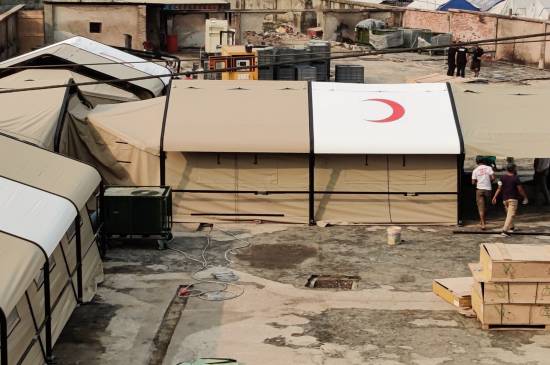Turkey sends 2nd batch of medical aid to Bangladesh's Cox's Bazar
The second batch of medical supplies has been sent to the fire-gutted Turkish field hospital located in a Rohingya refugee camp at Bangladesh's Cox's Bazar, an official said Friday.
"As we promised, today the second Turkish Air Forces (Command) cargo plane landed in Chittagong airport bringing medical equipment and 13 health professionals for the new Turkish field hospital that is being reestablished in the Rohingya refugee camp," said Turkish Ambassador to Bangladesh Mustafa Osman Turan.
Earlier, the first flight containing equipment, along with a 26-member expert team, arrived in Bangladesh on Saturday and had already begun rebuilding the fire-gutted hospital from its ashes, with a target to resume health services by next week.
The Turkish field hospital was completely destroyed in the giant blaze at the world's largest refugee camp in Cox's Bazar. The fire also consumed over 10,000 Rohingya tents, killed at least 15 people and injured more than 550 members of the persecuted community.
People inspect debris after a fire in a makeshift market near a Rohingya refugee camp in Kutupalong, Bangladesh, Friday, April 2, 2021. The fire broke out early Friday when residents of the sprawling Kutupalong camp for Myanmar's Rohingya refugees were asleep. (AP Photo/Shafiqur Rahman)
As many as 45,000 Rohingya were internally displaced due to the deadliest fire ever at the refugee camps on March 22.
"Our hospital will be fully functional very soon, resuming its essential health services to a thousand patients daily from (the) Rohingya and host communities," Turan said.
Currently, more than 1.2 million Rohingya, marked as one of the world's most persecuted people by the United Nations have been living in crammed makeshift tents in Bangladesh's southern tourist-hub city of Cox's Bazar.
Most of the members of the stateless community fled a brutal military crackdown in the western Rakhine state of their home country Myanmar in August 2017 and took shelter in neighboring Bangladesh.
Frequent incidents of fire at the congested camp settlements have made life more challenging for the Rohingya refugees.
Another major fire in mid-January this year also burned over 500 shanties to ashes, while dozens of minor fire incidents have also been reported since the mass exodus of the persecuted community, including the latest fire early Friday that claimed three lives and destroyed seven refugee shops.


